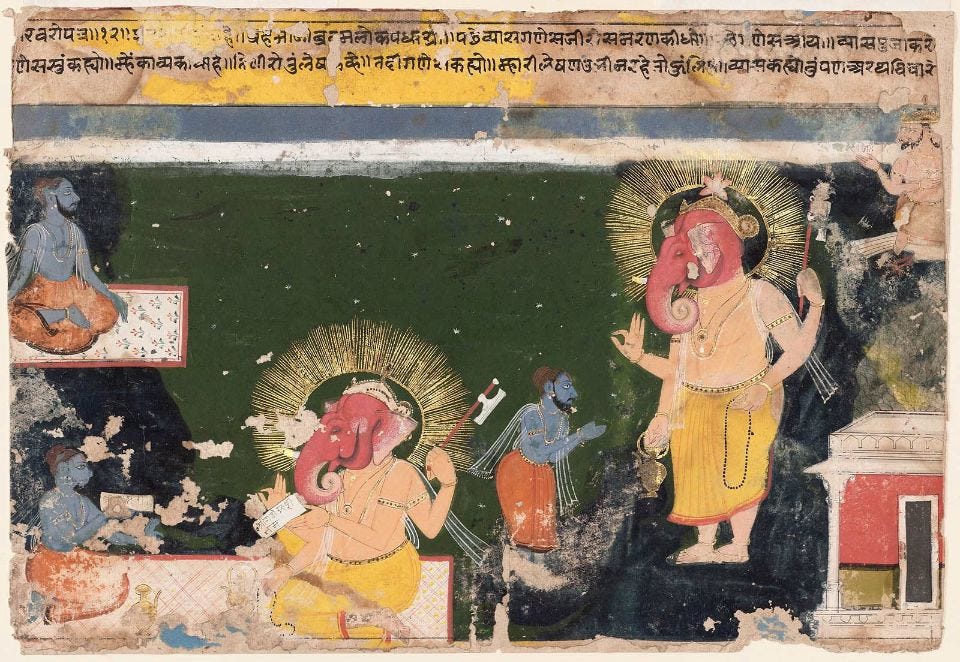Jayary Newsletter # 94

The Rising Sea
While the war between the Pandavas and the Kauravas is at the heart of the epic, the first few parvas have much else in them.
The Adi Parva is huge and much of it isn't about the Kurus, and even less of it is about the Pandavas. We are hundreds of pages into the Adi Parva when the snake sacrifice ends and Janamejaya settles down to hear the story of his ancestors.
It's only toward the end of the Adi Parva - more than twelve hundred pages in the P. Lal version that I am using as a reference - that the Pandavas achieve their alliance with the two Krishna's, Krishna Vasudeva, the god of all gods, and Krishnaa, i.e., Draupadi, their common wife.
The Sabha Parva focuses on the rivalry between the Pandavas and the Kauravas and ends with the iconic dice game. However, the relatively short Sabha parva is sandwiched between the long prehistory of the human race in general and the Kurus in particular as told in the Adi Parva and the various side stories of the third parva, the Vana Parva.
I am about a third into the Vana parva; that's another five hundred pages in Lal's version, most of which are occupied with Yudhishthira hearing the story of Nala and Damayanti, the value of pilgrimage and the adventures of Agastya.
It's almost as if Vyasa and his audience knew they weren't going anywhere; that they would be listening to one long story day after day. What if we take a detour for a month? There's always another month.
The Jaya is like the rising sea.
The Nutcracker and the Ocean
The rising sea isn't my metaphor. It comes from unpublished writings of the great French mathematician, Alexander Grothendieck.
Grothendieck talks about two styles of mathematical problem solving: the nutcracker and the ocean. The nutcracker is a specialized instrument with one purpose: cracking nuts. Some mathematicians are excellent nutcrackers: they know how to press upon a problem at exactly the right spot and crack! A targeted solution to a precise problem.
That wasn't Grothendieck's style. Instead, he thought of himself as the sea surrounding a rock. It might take years, decades, even centuries, but sooner or later, the rock dissolves in the ocean. And then it's as if the rock never existed. But it's not just that rock that's been taken back- many other rocks have also been subsumed by the ocean in the process.
The Jaya isn't a nutcracker. There might have been a time when it was a repository of specific answers to specific problems but that's not our time. We can only hope that it's a forgotten ocean which is slowly seeping out into the m-world. A nibble there, a shave here, we can only hope that the Jaya will help us digest the m-world one grain of sand at a time.
Anti-Occam
It's actually a great relief to know that the Jaya is a tortoise, not a hare.
I mean, if it's possible to capture the entire world in one equation, let's do so, but let's also be clear that bottling the universe in a small dabba can only serve some of our needs, not all of them.
The physicist will be happy that there's one equation to rule them all, but will it please the poet? Describing the universe in a sentence doesn't tell me why the rose in front of me is as red as it appears. It says even less about why that rose smells the way it does and it doesn't help me extract the rose's nectar at all.
Theoretical understanding has its limits, though it's awesome as long as it stays within those limits.
The Jaya is much more versatile; it offers a range of mental tools. Some are good for theoretical purposes. Others help us tell a great story. And yet others offer counsel in times of despair. As I have said before, these tools lie buried in the itihasm and it's our Grothendieck like task to rework those tools for our purposes.
By the way, while Grothendieck's algebraic geometry is as abstract as anything gets to be in the world of mathematics, it's not reductive. Grothendieck wasn't trying to reduce the world of mathematics to that of logic; instead, he ended up invented an abstract world that was even larger than the (relatively more) concrete world he was trying to understand.
It's the opposite of Occam's razor. So is the Jaya.


